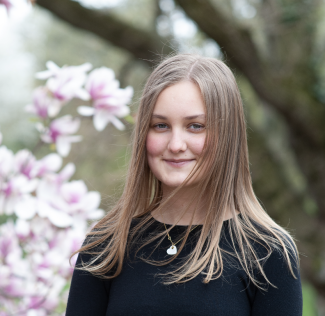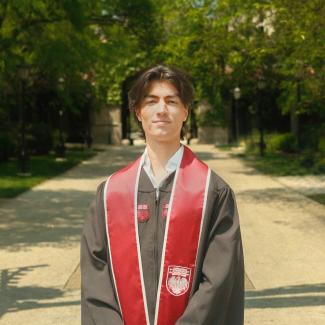
Every year, the Music Department graduates a number of promising and accomplished music majors from the College. We are very excited to celebrate the achievements of Campbell Conard, who received the 2025 Leonard B. Meyer Prize for Musical Excellence, as well as Marc Lindgren, who received the 2025 Olga and Paul Menn Prize for Composition.
Campbell Conard, Leonard B. Meyer Prize for Musical Excellence

Abstract:
“Girlhood, Authored: Olivia Rodrigo and the Practice of Authenticity” investigates the creative work and strategic marketing of singer-songwriter Olivia Rodrigo, exploring her impact and place within the popular music landscape. This thesis examines the link between authorship and authenticity, examining the mechanisms through which young female popular music artists create work and the gendered frameworks in which Rodrigo—and her contemporaries—exist and perform. Rodrigo’s work and career serve as a case study for a broader interrogation of popular culture, popular music, authenticity, and agency.
About Campbell Conard:
Campbell Conard earned her Bachelor of Arts in Economics and Music with Honors from the University of Chicago. Her interest in popular music, the social impact of pop culture, and the broader media market culminated in her thesis project. After graduation, Campbell is excited to return to her hometown (New York City) and become an NBC Page, working with various media and entertainment teams at the iconic 30 Rock building.
Marc Lindgren, Olga and Paul Menn Prize for Composition

Abstract:
Orbit is an eight-channel electroacoustic work that sonifies the orbital mechanics of our solar system. Each audio “orbit-stem,” one for every planet, carries a synthesized timbre whose spatial trajectory is driven directly by scaled planetary data rather than conventional musical gesture. The stereo field becomes an imagined ecliptic plane: real-time panning automation traces longitudinal motion left to right, while depth automation (volume and reverb) propels the sound forward and back, yielding a headphone-based three-dimensional image. Panning width is scaled to each planet’s orbital diameter, and the rate of circular motion is proportional to its true velocity, so Mercury’s quick, tight sweeps counterpoise Saturn’s slow, majestic arcs.
The piece draws on data-sonification trailblazers such as David Ibbett’s Octave of Light, Alex Parker & Melissa Graham’s Supernova Sonata, and SYSTEM Sounds’ TRAPPIST-1 Symphony. Like those precedents, Orbit balances determinism with poetic agency: algorithmic automations generate unpredictable rhythmic alignments and phasing events, while pitched material, modal color, and dynamic contour remain hand-shaped to evoke the luminous stillness and dramatic character of the void. The tension between cosmic indifference and human intention, between numbers that rule celestial bodies and the expressive human impulse to bend those numbers toward meaning, forms the work’s central aesthetic argument. Orbit invites the listener to inhabit an intimate sonic observatory and perceive the vast clockwork of our solar system as personal choreography; sensing through sound alone the fragile reciprocity between order and imaginative freedom.
About Marc Lindgren:
Marc Lindgren is an honors graduate of the University of Chicago, holding a dual B.A. in Economics and Music. A lifelong musician, he performs cello, piano, and guitar, and spent four years as a choral scholar at Rockefeller Memorial Chapel, deepening his passion for vocal repertoire and choral composition. An internship as a sound engineer in Los Angeles and Prof. Takashi Shallow’s "Video Game Music Production and Sound Design" course sparked his special fascination with electronic music. Marc continues composing and performing while preparing to relocate to Germany, where he will be pursuing a career in finance.
